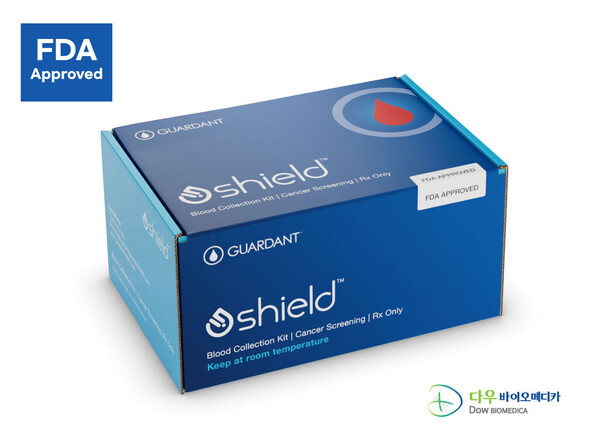A blood test that could replace fecal occult blood tests and colonoscopy for colorectal cancer screening is likely to be introduced in Korea.
Dow Biomedica said Tuesday that it has signed a domestic sales and distribution agreement for “Shield,” a colorectal cancer screening method developed by U.S.-based Guardant Health, and has begun preparations for full-scale commercialization.

Shield detects colorectal cancer by analyzing the DNA methylation pattern of cell-free DNA (cfDNA) in the blood to detect molecular signals related to colorectal cancer.
This method requires only a blood draw during an outpatient appointment, without the prior dietary adjustments or bowel cleansing of a colonoscopy. It has the potential to increase screening participation rates while dramatically minimizing patient burden.
In a clinical study of more than 20,000 participants in the United States, Shield demonstrated a sensitivity of 83 percent and specificity of 90.3 percent in screening for colorectal cancer, with reported patient compliance of more than 90 percent. This is much higher than traditional colonoscopy (28-66 percent) and fecal occult blood tests (up to 71 percent).
Shield won approval from the U.S. Food and Drug Administration (FDA) in 2023 for first-line colorectal cancer screening, the first blood-based test to be recognized as a first-line screening option. It is covered by Medicare and some private insurers and is listed in the U.S. NCCN colorectal cancer screening guidelines.
Shield was recently expanded to include Multi-Cancer Detection (MCD) technology for eight cancers, including lung, liver, bladder, ovarian, and colorectal cancer, which has been designated as a Breakthrough Device by the FDA, increasing the likelihood of early commercialization.
“Shield, a blood-based colorectal cancer screening test, is expected to address the limitations of existing screening methods and reduce patient burden while contributing to early detection and improved screening rates for those at risk of colorectal cancer,” Dow Biomedica said.

